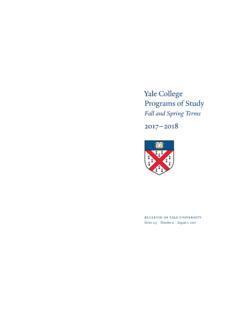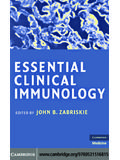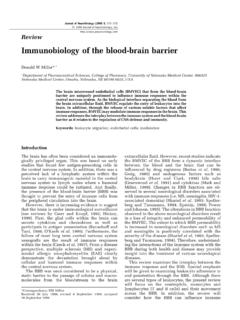Transcription of Immunobiology - Yale University
1 Immunobiology 1 ImmunobiologyAnlyan Center (TAC) S625, , , SchatzDirector of Graduate StudiesCarla Rothlin (TAC 625, , of Graduate AdmissionsJo o Pereira (TAC 541A, , Services OfficerBarbara Cotton (TAC S625, , Jeffrey Bender (Internal Medicine), Marcus Bosenberg (Dermatology), Alfred Bothwell, Lieping Chen, Joseph Cra (InternalMedicine), Peter Cresswell, Vishwa Dixit (Comparative Medicine), Richard Flavell, David Hafler (Neurology), Kevan Herold, AkikoIwasaki, Paula Kavathas (Laboratory Medicine), Steven Kleinstein (Pathology), Ruslan Medzhitov, Jordan Pober, Carla Rothlin, Craig Roy(Microbial Pathogenesis), David SchatzAssociate Professors Stephanie Eisenbarth (Laboratory Medicine), Tarek Fahmy (Biomedical Engineering), Ann Haberman, JohnMacMicking (Microbial Pathogenesis), Eric Meffre, Jo o Pereira, Kevin O Connor (Neurology), Bing SuAssistant Professors Grace Chen, Ellen Foxman (Laboratory Medicine), Nikhil Joshi, Carrie Lucas, Noah Palm, Aaron Ring, AndrewWang, Craig Wilen (Laboratory Medicine)Fields of StudyImmunology is the study of the immune system that confers protection against infectious diseases.)))
2 This complex system is also involvedin the rejection of gra ed tissues, in allergy, and in autoimmunity. The Department of Immunobiology is a multidisciplinary group ofinvestigators committed to understanding the cellular, genetic, and molecular basis of these processes. The department is based on theunderstanding that the solution to complex biological problems requires the integration of individuals with a common goal but differingexpertise. Research focuses on the molecular, cellular, and genetic underpinnings of immune system function and development, on host-pathogen interactions, and on a variety of autoimmune disorders.
3 In addition to the growing need to apply basic science research towardhuman disease, we have developed a Human and Translational Immunology (HTI) section to improve our understanding and treatmentof human immunological disorders. The general research interests of the Immunology track span almost all aspects of the immune systemand its role in disease AreasFundamental mechanisms of immunity Research in the department examines the fundamentals of the immune system at multiple levels:development, activation, regulation, and evolution. Studies of lymphocyte and innate immune cell development examine the receptorsand signals that control lineage commitment, cell maturation, and cell death; the establishment of the proper environments for cellulardevelopment; and the mechanisms by which antibody and T cell receptor genes are assembled and diversified.
4 A critical first step in aneffective immune response is the activation of cells of the innate immune system, including monocytes, macrophages, dendritic cells,and neutrophils. Research examines the receptors and signaling molecules that control these processes, the mechanism by which cellsprocess and present antigen, and the recognition of this antigen by T cell receptors on T lymphocytes. Upon activation, T and B cellsdifferentiate and acquire critical effector functions including the production of cytotoxic anti-pathogen molecules and antibodies. Studiesin the department examine the tissue spatial context and cellular interactions that influence effector lineage fate decisions, cytoplasmicsignal transduction molecules, nuclear transcription factors, and mechanisms controlling gene expression during differentiation.
5 Finally,resolution of the immune response (leading to scarring or healing) and the evolution of adaptive immunity are under human immune system The immune system has evolved to deal with many different challenges, some of which can vary widelyamong vertebrate species, and thus while many basic mechanisms may be shared between humans and various animal models, thehuman immune system has evolved to differ in important ways from that of commonly used experimental rodents. Furthermore, humandiseases, especially chronic disorders, are also significantly more complex than commonly used disease models, and the approachesto studying human immunity, for ethical reasons, must o en be fundamentally different from those used in experimental immunotherapies, especially those based on the use of biologicals, have created an opportunity to ethically investigate humanimmunology and improve the value of clinical trials.
6 The Human and Translational Immunology (HTI) section of the Immunobiologydepartment studies both the immune systems of healthy individuals and the roles that immunology plays in a variety of human diseaseand analyzes the alterations that therapies may have on the immune response. HTI investigators also develop new approaches for humaninvestigation and create new experimental models that better replicate human ImmunobiologyImmunology of cancer The past several years have witnessed a revolution in cancer treatment based on the paradigm of activatinga patient s own immune system to target their cancer.
7 Cancer immunotherapy relies on the immune system s ability to not onlyrecognize non-self, but altered self, detecting the remarkably subtle differences between cancer cells and healthy tissues. Moreover,many therapies rely on preexisting immune cells in the tumor microenvironment for efficacy, highlighting the potential of naturalimmunosurveillance mechanisms to destroy cancer. In close collaboration with the Yale Cancer Center, ongoing work in the Departmentof Immunobiology focuses on seeking to understand the basic mechanisms of how innate and adaptive immune responses are generatedagainst tumors, how tumor clearance is achieved, and how the immune system can be manipulated to enhance of the immune system Adaptive immune responses provide powerful long-lived protection from pathogens, but whenmisdirected, T and B cell responses can cause significant injury and disease.
8 The mechanisms controlling inappropriate adaptiveimmunity to self-targets/autoantigens (autoimmunity), allergens (allergy), or transplanted tissues (alloimmunity) are being addressedby faculty in our department. Diabetes, multiple sclerosis, lupus, and rheumatoid arthritis are just some of the autoimmune diseasesunder study. Why and how allergens are targeted by the immune system in diseases like food allergy and asthma are questions beingactively studied. Vascular gra and red blood cell rejection are examples of alloimmune responses under investigation in our interactions The immune system evolved to manage our constant exposure to diverse microbial stimuli, ranging from thesmallest viruses to fi y-foot-long tapeworms.
9 Researchers in the Department of Immunobiology investigate the full spectrum of possiblehost-microbe interactions, including antagonistic interactions with parasitic viruses, bacteria, and helminths, as well as mutualisticinteractions with the trillions of microbes that live in and on us (our microbiota).Inflammation biology Inflammation is a protective response including infection and injury as well as other causes of loss of tissuehomeostasis. Although primarily orchestrated by the immune system, the inflammatory response can affect virtually any physiologicalprocess, from cardiovascular and digestive functions to growth, reproduction, and behavior.
10 However, because inflammation operatesat the expense of some normal physiological processes, it can also be a source of a variety of pathological sequela. Indeed, most humandiseases are now known to be associated with inflammation. Research in our department addresses multiple aspects of inflammationbiology, ranging from detailed molecular mechanisms underlying the response, to human immunology Computational immunology (or systems immunology) involves the development and application ofbioinformatics methods, mathematical models, and statistical techniques for the study of immune system biology. The immune system iscomposed of dozens of different cell types and hundreds of intersecting molecular pathways and signals.











